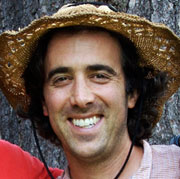Shamu Sadeh
My work at Adamah is well aligned with your four propositions.
Chochmah: When I teach Jewish creation stories I pair Rashi’s commentary on Genesis 2:7 with secular philosophical writings. I teach the Book of Job together with Aldo Leopold. The majority of my students feel very engaged in this approach to Jewish learning. (How to be authentic Jewishly while putting texts in the context of other cultures can be a challenge.) In parallel to your example of EPU Project, for the past two springs we have welcome a group of Christian seminarians to share a week of classes, prayer, field work and conversation with the young Jews of Adamah. The depth of engagement from both sides, the opportunity to explain Judaism to someone from the outside, the sense of difference and solidarity made for a very meaningful experience for the Adamah Fellows.
Tzedek: While we are more ecologically focused at Adamah than traditional social justice work we are aligned with the tzedek proposition. The passion for repair, the desire to find synthesis between Judaism and current ecological and social issues is one of the main reasons young Jews come to us.
Kehillah: A central piece of the work we do is creative inclusive, supportive pluralistic Jewish community. Participants are able to engage deeply in all the spiritual and leadership work: to find themselves, to grow and change their identity, and to build close relationships because of the very particular and unique nature of the Adamah and Isabella Freedman community. The community is egalitarian (and even anti-authoritarian) with significant women’s leadership, it is queer friendly, accessible to those with little Jewish background, and has a creative, DIY vibe while still engaging authentically with Jewish tradition.
Kedushah: For sure the ability to frame and provide (as much as this experience can be ‘provided’) holy experiences is central to the work we do at Adamah. We are all about experience first, concepts and specific practices later. We find a lot of inspiration in Rabbi A.J. Heschel and the original and ‘neo’ hasids (Rabbi Arthur Green) for the emphasis on heart not just intellect. Farming, food and outdoor work centers on the experience of awe, gratitude and interconnectedness that happens when you pick a carrot out of the soil, watch a sunset, sign ‘Modeh ani’ as the mist rises on the lake. All the Jewish and ecological and community work we do follows from these core experiences.
- In what ways does your work advance an area of Jewish life or practice that is outside of the four propositions?
I do not have time to elaborate at present. Here are some quick notes on this huge question that might be better elaborated on in conversation with others.
- Pluralism
- Creative approach to the evolution of Jewish culture and ritual (eg. creating new rituals)
- Additional Thoughts
For some young Jews Israel is a barrier to Jewish engagement not just “anything but a unifying force”. Some young Jewish leftists, particularly some who fit within the universalist/justice seeking perspective you discuss, feel alienated from Jewish communal institutions because of what they see as the categorical “We Stand with Israel”; the inability to criticize Israel, and the lack of true dialogue.
I found ‘covenantal’ Jews a confusing term despite your explanation. The points of reference and implications of the word covenant suggest or at least imply an identity formed around a binding relationship to God and/or fundamental tenants or Jewish law/practice, as well as the sense of chosen people. Your description of a universalist, justice-oriented identity is accurate but I think you need a better name for this.
____________
Shamu Sadeh co-founded Adamah and has been its program director since 2004. He has been a farmer, teacher, writer and wilderness guide. Drawn to the integration of soul and soil, he works for the creation of a fruitful ecological landscape that builds confidence, mindfulness and community among participants.


